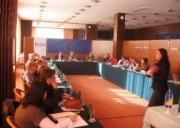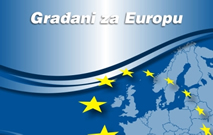Training in Sarajevo on gender resposible budgeting
 Vesta Association from Tuzla, in cooperation with n.g.o. Udružene žene Banja Luka, held a two-day training in Sarajevo on gender responsible budgeting. The training was implemented as part of the project Gender responsible budgeting as part of reform changes on the road to EU integration and the basis for strengthening women's rights in BiH. This project is supported by the European Union.
Vesta Association from Tuzla, in cooperation with n.g.o. Udružene žene Banja Luka, held a two-day training in Sarajevo on gender responsible budgeting. The training was implemented as part of the project Gender responsible budgeting as part of reform changes on the road to EU integration and the basis for strengthening women's rights in BiH. This project is supported by the European Union.
The training is meant for representatives of ministries of finance, ministries of labour and social welfare, parliamentary commissions for gender equality and NGOs from Cantons in Federation BiH, RS, and Brčko District. During the two-day training participants had an opportunity to acquire applicable knowledge about gender equality and gender responsible budgeting, and to apply that knowledge in the gender analysis of cantonal, entity and budget of Brčko District, from the aspect of allocations for newly delivered mothers. They also shared guidelines for drafting of the Action Plan for the promoting of the position of newly delivered mothers in BiH.
˝We think that there are between 32 and 35 thousand newly delivered mothers a year. The state policy was such that it lead to inequality of rights and entitlements of newly delivered mothers in two entities, whether they are employed or not. In Federation BiH this problem is related to cantonal budgets with different entitlements in different cantons, and it is also questionable whether rights to those entitlements are being exercised at all ˝, said Amra Selesković, director of Vesta Association. She emphasised that it is necessary to ensure at least one minimal amount which will be equal for all newly delivered mothers in BiH.
Executive director of Udružene žene Banja Luka, Nada Golubović, feels that the problems of newly delivered mothers must not be an entity but a problem of national relevance. ˝I think that there should be umbrella entity laws in FBiH and RS on entitlements for newly delivered mothers. If budgets, from local community up to the national level, were gender sensitive, many problems of women and men would be addressed ˝, Golubović stated.
The project addresses an evident need for introduction of gender perspective in the budgeting process in BiH. This is also outlined in our country's obligations in relation to the EU integration. On the other hand, the project is specifically directed at improving the position of newly delivered mothers in BiH, a very vulnerable group of beneficiaries, whose status is directly affected by budgetary allocations. From the advisory and expertise aspect, the project was supported by the Gender Equality Agency of BiH, Gender Centre of Federation BiH and Gender Centre – Centre for equality and gender equality of the RS.


